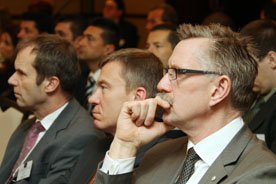Countering WMD threats in the maritime environment
2012 International Partners' Outreach Event
NATO places a high priority on preventing the proliferation of weapons of mass destruction (WMD) and defending against chemical, biological, radiological and nuclear (CBRN) threats.

As part of Allied overall efforts against proliferation of Weapons of Mass Destruction (WMD), NATO’s 2012 International Partners’ Outreach Event of the NATO Committee on Proliferation in Defence format (CP (D)) took place in Riga, Latvia, from 20 to 22 March 2012. To provide a broader and scientific view on issues related to countering WMD Threats in Maritime Environment, a NATO Science for Peace and Security Advanced Research Workshop was organised back-to-back with an Industries Chemical, Biological, Radiological and Nuclear (CBRN) Defence Exhibition under the joint title “Countering WMD Threats in Maritime Environment - Development of Technologies and Modelling of Risks”. Both events were co-organised by CP(D) Co- chairs Latvia and the United States, and Sweden as a partner nation.
 Around 90 participants from 15 NATO countries, 9 Partner nations (from the Euro-Atlantic Partnership Council, Mediterranean Dialogue and Istanbul Cooperation Initiative, as well as Japan and Saudi-Arabia), NATO agencies, and the Helsinki Commission attended these events. In addition, ten industries presented their products and services related to the seminar topic.
Around 90 participants from 15 NATO countries, 9 Partner nations (from the Euro-Atlantic Partnership Council, Mediterranean Dialogue and Istanbul Cooperation Initiative, as well as Japan and Saudi-Arabia), NATO agencies, and the Helsinki Commission attended these events. In addition, ten industries presented their products and services related to the seminar topic.
Opening the Outreach Event Mr Jānis Garisons, Political Director of the Latvian Ministry of Defence said, “As the European co-chair of the Committee on Proliferation, Latvia sees WMD threats in the maritime environment as one of the priority areas during our co-chairmanship. The Baltic Sea region clearly shows that no action can be effective without cooperation between different states beyond institutional borders. In the same way, NATO cannot take actions on its own. Cooperation with partner nations and organisations could better equip the Alliance to respond to the WMD threat.”
Both events provided an excellent platform for Allies and partners to share experiences and views on issues related to countering WMD threats in the maritime environment. It gave an opportunity, by fusing the information between scientists and representatives from military and civil institutions, to further elaborate on different aspects of developing counter WMD proliferation capabilities, as well as to discuss the technological approaches to facing possible threats originating from the transit of WMD by sea, sea-dumped chemical weapons, and other challenges related to WMD proliferation by sea.
The supporting industries exhibition gave scientists, defence experts and industry representatives an excellent opportunity to meet, discuss and make contacts. The industry representatives had a special session for their presentations.
Colonel Ronald Fizer, representing the US Co-Chairs of the Committee on Proliferation summarised, “This seminar brings together many of the committed parties within the international community, so not just NATO and the members of the Alliance, but also partners all committed to making the world safer, and specifically in this case focused on countering the proliferation of weapons of mass destruction: so that this does not become a threat to any of our communities.”
